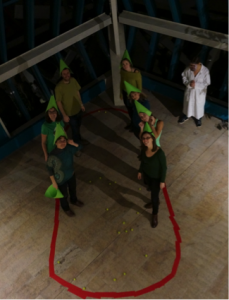From London to Paris – Travelling through Cell Science
Posted by sakrok, on 7 April 2016
Thanks to the Cell Science Travel Fellowship of the Company of Biologists, I was able to work for 2 months at the Institut National de la Recherché Agronomique (INRA) in Jouy-en-Josas, a small town close to Paris, in France.
I just started the second year of my PhD in the group of Dr. Mostowy at Imperial College London. The Mostowy group is well known to study host cell biology, focusing on the eukaryotic cytoskeleton (actin, microtubules, intermediate filaments and septins). The discovery that prokaryotes exhibit counterparts of the major cytoskeletal components (e.g. MreB, FtsZ, CreS) radically changed the context how bacteria are studied and helped to inspire the field of bacterial cell biology. To travel from eukaryotic to prokaryotic cell biology, I went to the lab of Dr. Rut Carballido-López, who is well recognised for her pioneering work on the actin-like MreB cytoskeleton in Bacillus subtilis.
New techniques to study the cytoskeleton include genetic modifications to follow the spatiotemporal location of cytoskeletal proteins (e.g. fluorescently tagging) and to analyse their function (e.g. gene inactivation). Both approaches are applied in eukaryotes and prokaryotes, however the precise methods are completely different between these kingdoms (e.g. siRNA versus knockouts). In eukaryotes as well as in prokaryotes, cytoskeletal proteins are key structural determinants that assemble into filaments and their genes are essential for viability, which makes their genetic manipulation even more challenging. Luckily, I was working with Arnaud Chastanet, a highly experienced Research Scientist (CR1) with great visualisation and explanation skills, and Charlène Cornilleau, an Ingénieur d’Etudes with ‘magic cloning hands’, who supported me greatly with my clonings.

Picture: The actin-like MreB cytoskeleton (green) in Bacillus subtilis (red).
It was a great experience to work in the lab of Dr. Rut Carballido-López. Everyone in the working group was really friendly and helpful and I had many interesting discussions – science-related and beyond. My visit allowed me to expand my knowledge in microbial genetics. Now back in London, I can share my knowledge and tools, and allow other scientists to benefit from my stay at INRA. Working in France provided me with the unique opportunity to experience science internationally, and to network with people for my future career in science. I am deeply grateful to Dr Rut Carballido-López for enabling my collaborative visit and to The Company of Biologists for awarding me with a Cell Science Travel Fellowship.


 (3 votes)
(3 votes)